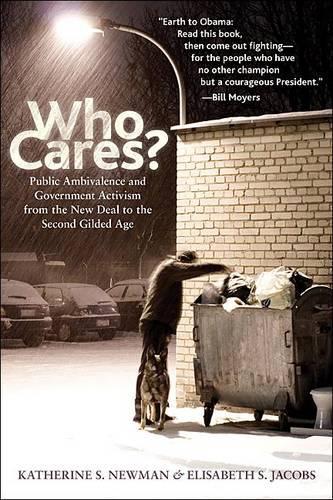
Who Cares: Public Ambivalence and Government Activism from the New Deal to the Second Gilded Age
(Hardback)
Publishing Details
Who Cares: Public Ambivalence and Government Activism from the New Deal to the Second Gilded Age
By (Author) Katherine S. Newman
By (author) Elisabeth S. Jacobs
Princeton University Press
Princeton University Press
15th June 2010
United States
Classifications
Tertiary Education
Non Fiction
Central / national / federal government
338.973
Physical Properties
Hardback
240
Width 152mm, Height 229mm
454g
Description
Americans like to think that they look after their own, especially in times of hardship. Particularly for the Great Depression and the Great Society eras, the collective memory is one of solidarity and compassion for the less fortunate. Who Cares challenges this story by examining opinion polls and letters to presidents from average citizens. This evidence, some of it little known, reveals a much darker, more impatient attitude toward the poor, the unemployed, and the dispossessed during the 1930s and 1960s. Katherine Newman and Elisabeth Jacobs show that some of the social policies that Americans take for granted today suffered from declining public support just a few years after their inception. Yet Americans have been equally unenthusiastic about efforts to dismantle social programs once they are well established. Again contrary to popular belief, conservative Republicans had little public support in the 1980s and 1990s for their efforts to unravel the progressive heritage of the New Deal and the Great Society. Whether creating or rolling back such programs, leaders like Roosevelt, Johnson, Nixon, and Reagan often found themselves working against public opposition, and they left lasting legacies only by persevering despite it. Timely and surprising, Who Cares demonstrates not that Americans are callous but that they are frequently ambivalent about public support for the poor. It also suggests that presidential leadership requires bold action, regardless of opinion polls.
Reviews
"All who are interested in US public opinion concerning the role of government in support of social programs and the role that leaders can play in supporting or dismantling such programs should read this brief, timely, and well-written gem."--Choice "[I]n analyzing public opinion in three distinct periods of American political history, Katherine Newman and Elisabeth Jacobs set out some interesting observations for contemporary policy-makers."--Alastair Hill, LSE British Politics and Policy blog "The authors raise important questions about public opinion, policy making, and democracy. Scholars exploring shifts in the American safety net and American politics more generally will have to attend to the authors' arguments and their careful synthesis of public opinion data. Lay audiences and policy makers will find a useful and provocative, though quite general, overview of welfare state development alongside a passionate call for progressive political leadership to address the economic inequality and insecurity of the 'second gilded age.'"--Marisa Chappell, Journal of American History "Who Cares makes a contribution by providing a concise history of the interplay between the development of antipoverty policy initiatives and public opinion since the New Deal and by demonstrating consistent themes in attitudes toward the welfare state."--Tracy Roof, Perspectives on Politics
Author Bio
Katherine S. Newman is the Malcolm Forbes, Class of 1941, Professor of Sociology and Public Affairs at Princeton University. Her many books include "The Missing Class: Portraits of the Near Poor in America" (with Victor Tan Chen) and "No Shame in My Game: The Working Poor in the Inner City". Elisabeth S. Jacobs is a senior policy adviser to the Joint Economic Committee of the U.S. Congress
